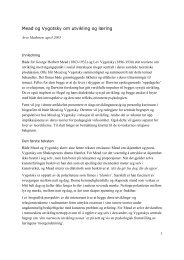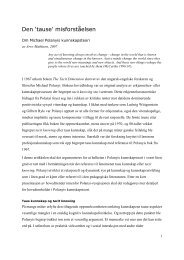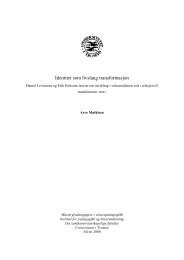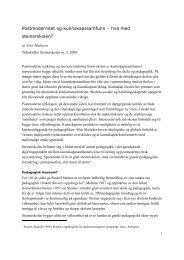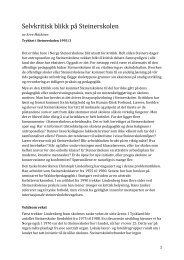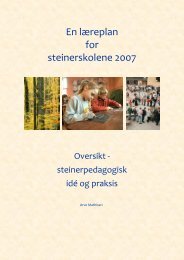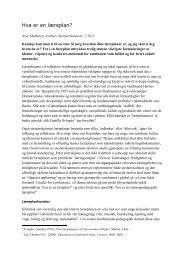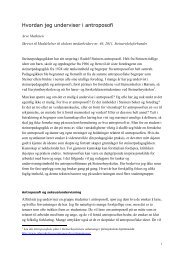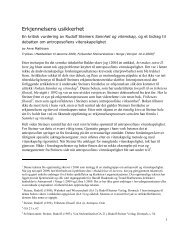How i teach anthropo.. - Arve Mathisen - tekster
How i teach anthropo.. - Arve Mathisen - tekster
How i teach anthropo.. - Arve Mathisen - tekster
You also want an ePaper? Increase the reach of your titles
YUMPU automatically turns print PDFs into web optimized ePapers that Google loves.
eincarnation right away and feel alienated from or troubled by concepts like etheric or astral<br />
bodies. For this reason I have chosen to compose the lectures by integrating dialogue about<br />
questions coming from the students and a thorough presentation of selected concepts from<br />
Waldorf education and <strong>anthropo</strong>sophy. Teaching <strong>anthropo</strong>sophy reminds me in many ways of<br />
sex instruction in the lower secondary school years. There is knowledge that can be<br />
communicated, but the value of the <strong>teach</strong>ing depends on all the participants feeling free to<br />
make their own decisions and form their own attitudes. A norm for what <strong>anthropo</strong>sophy can<br />
mean for each individual is just as non-existent as a “normal” sexuality. This has been a prime<br />
concern for me in <strong>teach</strong>ing <strong>anthropo</strong>sophy: how can I contribute to making an open, critical<br />
and inquiring atmosphere which both opens for what is interesting and potentially valuable in<br />
<strong>anthropo</strong>sophy and at the same time nurtures a critical attitude? This is not as simple as it<br />
perhaps sounds. For as soon as I start using <strong>anthropo</strong>sophical concepts, such as etheric body,<br />
for example, and try to present theoretical and practical perspectives on this, a kind of tacitly<br />
understood acceptance of the existence of an etheric body begins hovering in the classroom.<br />
According to the French thinker Michael Foucault’s ideas, it is evident that something as<br />
simple as a conversation and a reflection on a concept at the same time involves an influence<br />
upon those participating in such activities. I discuss this with the students and ask them to be<br />
careful. I want to contribute to an understanding of <strong>anthropo</strong>sophy, not to the spreading of<br />
what I call “<strong>anthropo</strong>sophical conceptual realism”. By this, I mean that such things that<br />
Steiner describes in his lectures are automatically expected to have a parallel in the students’<br />
experience. Ideas should be treated as ideas. It is then up to each individual to decide how the<br />
ideas can relate to his or her own thinking, personal experience and practice. The intention of<br />
the lectures is to work with Steiner’s basic ideas and concepts with the students in an<br />
understandable manner, without the individual student blindly accepting the whole or parts of<br />
Steiner’s world of thought. As I see it, a pronounced critically oriented <strong>teach</strong>ing can penetrate<br />
deeply into <strong>anthropo</strong>sophy’s descriptions of the human being and the cosmos.<br />
Basic ideas?<br />
What is meant by basic <strong>anthropo</strong>sphical ideas? Steiner’s work covers innumerable themes<br />
from religion, art and science. A catchword catalogue published in 1998 filled over 2500<br />
pages 1 . Who can take this in or have the courage to present parts of such an overwhelming<br />
amount of material? Luckily, one might say, Steiner has nevertheless tied most of his<br />
presentations to just a few major concepts. Yes, to put it simply, it can be said that Steiner<br />
expressed large parts of his <strong>anthropo</strong>sophy from two perspectives. The one perspective is<br />
thinking-feeling-willing. Steiner uses this triad of concepts when he presents topics like the<br />
human physical body as well as psychological and spiritual phenomena. At the founding of<br />
the first Waldorf School in 1919, it was just these three − thinking, feeling and willing − that<br />
were the point of departure for Steiner’s presentation of central pedagogical and human<br />
1 Steiner, Rudolf, Mötteli, Emil (1998). Register zur Rudolf Steiners Gesamtausgabe. Dornach: Rudolf Steiners<br />
Verlag.<br />
2



